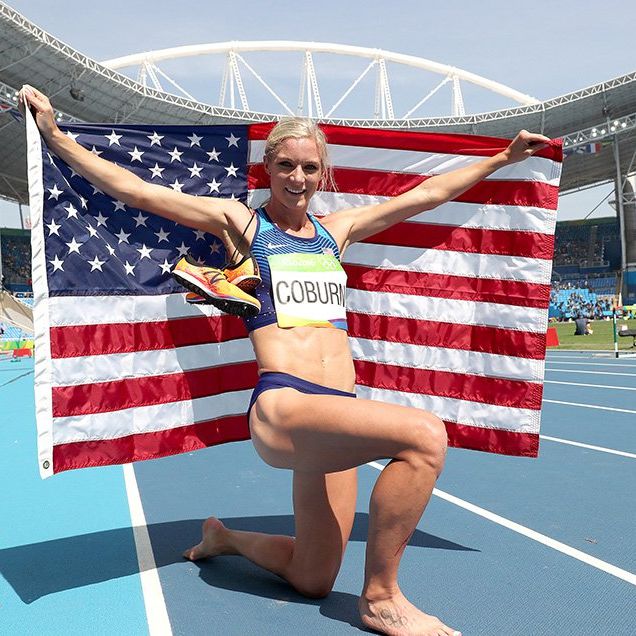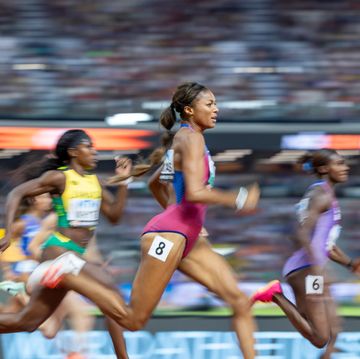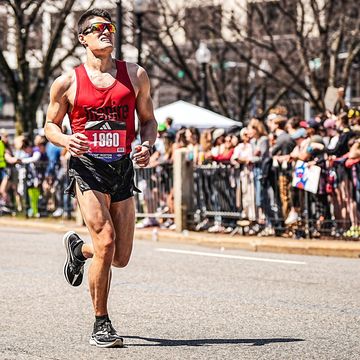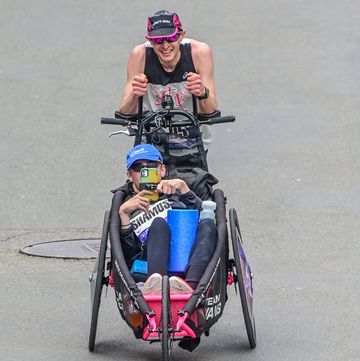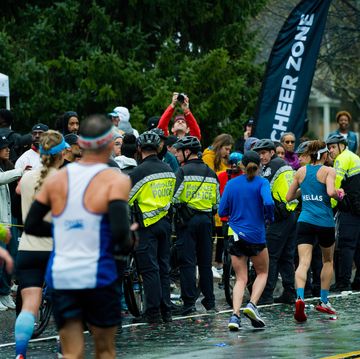Emma Coburn, the 2016 Olympic bronze medalist in the steeplechase, is the picture of athleticism anybody would expect from a world-class runner—chiseled, muscular, and fit.
But the images of Coburn, 26, that appear in media like the 2016 ESPN Body Issue aren’t exactly what she hopes to look like at her wedding in October, she first told People magazine last week, then explained further to Runner’s World on Sunday.
Like all runners, when she’s in peak season and the training intensity is high, Coburn naturally loses weight and becomes very lean. It’s not a process she’s focused on—it just happens by running many miles, lifting, and cranking up speed workouts. In fact, she rarely relies on a scale for feedback. She planned her wedding day to fall during her running break, when she says she’ll fill out the dress a little more and feel free to indulge in whatever food and drinks she craves.
“I’m not someone who stresses about my diet and I don’t count calories,” Coburn says. “I don’t worry about that part of it as long as I’m feeling fueled and getting the right nutrients when I need them. I love cooking and I love running and I love eating—all these things are in a happy balance together.”
Most runners, no matter what ability, see weight fluctuations occur naturally throughout the year. It’s normal—and even healthy—to gain weight when the mileage is low or it’s time to take a hiatus from running altogether.
“You can be a strong, happy, successful runner and not have a negative relationship with the food you eat or a negative view on your diet,” Coburn says.
Coburn and Lizzie Kuckuk, a registered dietitian at the Sanford Sports Science Institute, offer some tips on managing a healthy attitude toward fueling, weight, and training seasons:
A time for fun. Coburn, who is marrying Joe Bosshard, says that her fall break isn’t only to allow her body to recover from the months of strenuous training. She also needs that time to mentally let loose. A wedding is maybe one of the best reasons to indulge—and even better if the bride isn’t worried about zipping up her dress.
“Up until this point there have been dresses I’d try on and look down and just see my ab muscles—I don’t think I want that necessarily to be what the focal point of my wedding day is,” she says. “I can go and have parties and brunches with friends and not be stressing. In the off-season I don’t have reservations about having a bunch of fun and eating whatever I want.”
During periods of extreme focus on race goals, all runners have to decide whether to have that second beer or third cookie, not because it might impact performance but because of how it might affect sleep or stomach issues during the next day’s run. Kuckuk says that kind of concentration is unsustainable, which is why everybody needs to stop once in a while.
“The off-season is a great time to try new foods,” Kuckuk says. “Some people have sensitive stomachs so they have to cut out something like Mexican food while they’re training. When you’re on a break, you don’t need to worry about how it’s going to affect your G.I. system during a long run.”
Don’t be too strict. Even during the training season, Coburn doesn’t like to place restrictions any kinds of foods. Mostly she cuts down on dessert or drinks less wine. Otherwise, her diet doesn’t generally look much different throughout the year. She’s careful to eat quality, healthy, whole foods and makes sure she’s getting enough calories in to replenish glycogen stores within 30 minutes of a workout.
Kuckuk agrees with that philosophy.
“It’s okay to have ice cream once in a while,” she says. “If you don’t allow yourself to do that, that’s when we go overboard in the off season.”
Go by feel. You will know you’re at the appropriate weight to meet your racing goals if you feel strong and powerful when you’re running, Coburn says. If she begins to experience consecutive runs that don’t go well—she feels overly fatigued or can’t recover quickly—it’s a good indication that she might need to look at increased fueling and hydration.
“It’s about making sure the diet is supporting the intensity of training and getting enough fuel,” Coburn says. “It’s hard to articulate what ‘going by feel’ is for other people, but I measure my fatigue level.”
Kuckuk doesn’t advise that runners use scales. Sometimes when an athlete is starting to run more miles or adding strength training, he or she can actually gain weight during training through increased muscle mass.
“The number on the scale can make us feel defeated or like a failure,” she says. “Most of us just want to feel confident and look like a healthy athlete. That won’t always be reflected by a number on a scale.”
But don’t go too crazy. While it might sound enticing to eat a burger and fries every day for two or three weeks, it probably won’t result in an easy re-entry into training when it’s time.
One of Coburn’s go-to spots during break is a Mexican restaurant in Boulder, Colorado, where she lives. She enjoys a large burrito and the margaritas there. She also has a few more scoops of Phish Food ice cream when she’s not training.
“During that time I eat whatever I want, whenever I’m hungry,” she says. “Usually the first couple of days of the off-season you’re just shoving food in your face and having a ball. It’s more that you’re in celebration mode and less about cravings. My day-to-day isn’t like a freak show, though—I’m not having piles of unhealthy food in front of me.”
Most runners gain about 5–10 pounds on a training break, Kuckuk says, adding that it’s a healthy, natural range to target. It’s when somebody goes a little overboard and edges toward the 15-pound gain that it might be time to rein it in.
“You come back and think you can just run the same paces as you did before and you physically can’t do that if you’re carrying around 15 more pounds,” she says. “The 5–10 pound range is easy to get rid of with small dietary changes and an increase in mileage. But more than that, it’s hard to mentally feel good about getting back into training and running.”
But accepting the ebb and flow of weight is just part of being a runner who trains intensely for periods of time each year.
“My race weight isn’t something that is a natural place I can stay for more than a couple of weeks. My off-season weight isn’t necessarily what my natural weight should be either,” Coburn says. “The off season is about rest and recovery—for me, that’s eating what I want and doing whatever I want, and not exercising. That’s obviously going to make you gain a few pounds.”
